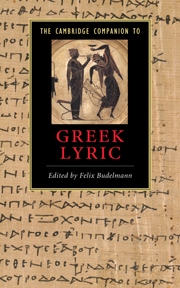Book contents
- Frontmatter
- Introducing Greek lyric
- Part I: Contexts and topics
- Part II: Poets and traditions
- Part III: Reception
- 16 Lyric in the Hellenistic period and beyond
- 17 Lyric in Rome
- 18 Greek lyric from the Renaissance to the eighteenth century
- 19 Sappho and Pindar in the nineteenth and twentieth centuries
- Epilogue
- 20 Lyric and lyrics: perspectives, ancient and modern
- Chronology of select melic, elegiac and iambic poets
- Further Reading
- Glossary
- List of works cited
- Index
16 - Lyric in the Hellenistic period and beyond
from Part III: - Reception
Published online by Cambridge University Press: 28 May 2010
- Frontmatter
- Introducing Greek lyric
- Part I: Contexts and topics
- Part II: Poets and traditions
- Part III: Reception
- 16 Lyric in the Hellenistic period and beyond
- 17 Lyric in Rome
- 18 Greek lyric from the Renaissance to the eighteenth century
- 19 Sappho and Pindar in the nineteenth and twentieth centuries
- Epilogue
- 20 Lyric and lyrics: perspectives, ancient and modern
- Chronology of select melic, elegiac and iambic poets
- Further Reading
- Glossary
- List of works cited
- Index
Summary
Like the works of Homer, Euripides and other classical authors, early lyric poetry quickly became part of the cultural treasure of the Greeks, even when - or should I say particularly when - they moved abroad, in search of a new life in the Hellenistic kingdoms in Egypt and Asia. Archaic melic, iambic and elegiac poems were no longer performed by the third century BCE, but they were studied carefully by philologists and, in selection, formed part of the syllabus of would-be orators. Likewise the learned lyric poetry produced by scholars was conceived mainly for reading, or recitation in closed circles. Lyric for wider audiences could still be performed in religious ceremonies or at public festivals, but for many reasons (historical, cultural, linguistic) lyric genres were slowly going out of fashion, increasingly outnumbered by simpler compositions in non-lyric (especially dactylic and iambic) metres. The most significant cultural feature of the Hellenistic period as regards lyric poetry was the importance that was attached to collecting and preserving texts from earlier periods.
From performance to edition
In the fifth and fourth centuries BCE, traditions about lyric poets of local and international renown flourished in mainland Greece, Magna Graecia and Asia Minor, yet Athens seems to have been where the memory of lyric poetry interacted most visibly with the production of new creations. Famous odes were used as educational texts. Dramatic authors composed lyric pieces as sections of their tragedies and comedies, where the chorus still played a fundamental role. Tragedians took inspiration from myths treated in lyric1 and often alluded to specific songs. Comedians not only quoted lyric poets, but made Sappho one of their favourite characters.
- Type
- Chapter
- Information
- The Cambridge Companion to Greek Lyric , pp. 297 - 318Publisher: Cambridge University PressPrint publication year: 2009
- 3
- Cited by



